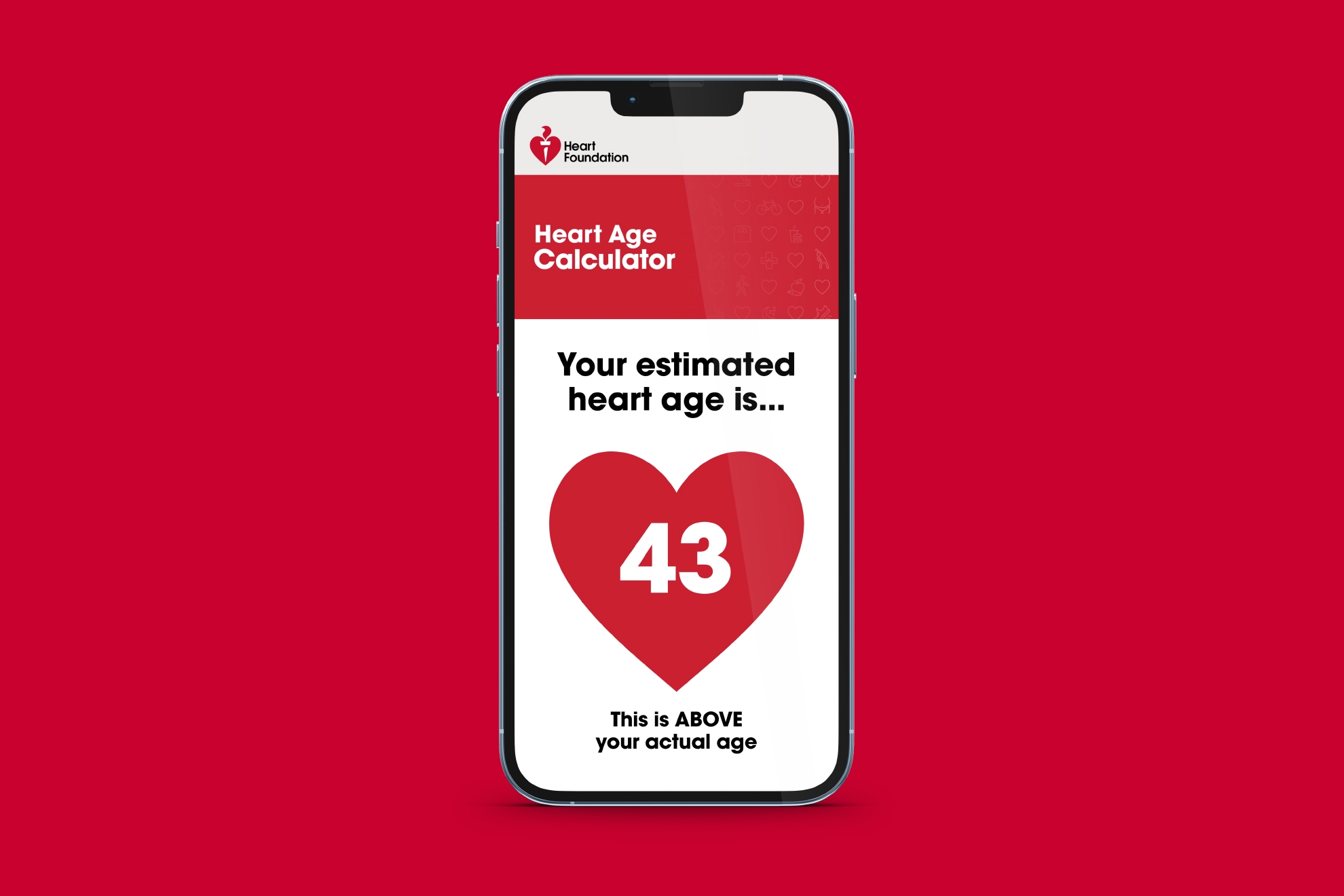
Is your heart feeling your age?
Calculate your heart age
Your heart health recommendations
People under 35
It’s never too early to start thinking about your heart health. Knowing your risk factors for heart disease or discussing your family history with your GP is an important first step.
Preventing heart disease starts with knowing your risk factors and making positive changes to lower your risk. Most heart attacks and strokes can be prevented with healthy choices.
Learn more about how your blood pressure, cholesterol and lifestyle impacts your risk of developing heart disease and steps you can take to lower your risk of developing heart disease.
For First Nations peoples, we recommend seeing your GP for a Medicare-subsidised Heart Health Check from the age of 30. From age 18, it’s recommended that you speak with your GP about your individual risk factors, such as blood pressure, smoking, and blood glucose levels.
People aged 35-44
It’s never too early to start thinking about your risk factors for heart disease or discussing your family’s history with your GP.
While there are some risks you can’t change – like age, sex, ethnicity and family history of heart disease – there are other risks you can take steps towards reducing like maintaining a healthy weight, being physically active and smoke-free, managing high blood pressure and high cholesterol.
If you are living with diabetes, we recommend you see your GP for a Medicare-subsidised Heart Health Check from the age of 35.
People aged 45+
If you are 45 years and over, we recommend you have a Medicare-subsidised Heart Health Check with your doctor at least every two years.
Frequently asked questions
What is a Heart Age?
The Heart Age Calculator helps people understand their risk of a heart attack or stroke by determining their heart age. Heart age is an assessment of well-known risk factors for heart disease (e.g. age, sex, blood pressure, cholesterol) to estimate an individual’s risk of heart attack or stroke compared to a defined healthy range. A heart age that is older than current age indicates elevated modifiable risk.
Who should use the Heart Age Calculator?
The Heart Age Calculator is designed for people aged 35 to 75 years who do not have heart disease or have not previously had a heart attack or stroke.
Which risk factors are used to calculate my heart age?
Your heart age is calculated on key risk factors for heart disease – age, sex, smoking and diabetes status, Body Mass Index (BMI), cholesterol levels, blood pressure and any medication to control it and whether or not you have a close family history of heart attack or stroke prior to age 60. If you do not know your blood pressure and cholesterol levels the Heart Age Calculator will use Australian average levels based on your age and sex.
How is my heart age calculated?
Using the information you enter about your key risk factors, the calculator estimates your risk of a heart attack or stroke in the next 5 years compared with the risk of someone at the same age with risk factors within the healthy range. So, if you get a heart age of 52 years, this means that the values entered into the calculator indicate you have the same risk of having a heart attack or stroke in the next 5 years as someone 52 years of age.
The Heart Age Calculator uses an algorithm to calculate the probability of a cardiovascular event occurring in the next five years based on your risk factors. The algorithm is based on a multivariate known as the Framingham Risk Function, a predictive equation developed using data from the Framingham Heart Study and incorporates Australian guidelines for people who are at increased risk of a heart attack or stroke.
Why are some risk factors missing from the calculation?
The Heart Age Calculator does not consider a person’s ethnicity, other heart conditions (like abnormal heart rhythms) or information about nutrition and physical activity status. Whilst these are still important risk factors for heart disease, they were not incorporated into the heart age calculation because there is insufficient data from the Framingham Heart Study to be able to estimate impact on risk. These risk factors will be considered by your doctor during a Heart Health Check and addressing them can help reduce your risk of heart disease as well as help control risk factors like blood pressure and cholesterol.
What if I don’t know my blood pressure or cholesterol results?
If you do not know your blood pressure and cholesterol levels the Heart Age Calculator will use Australian average levels based on your age and sex.
Does an elevated heart age mean I should start medication?
A heart age higher than your actual age indicates higher risk of having a heart attack or stroke, it does not indicate the need to start medication. The Heart Age Calculator is a motivational tool to raise awareness about heart disease risks and to prompt people to take action by having a Heart Health Check with their doctor. The Heart Age Calculator is not a clinical tool and does not replace the need to see your doctor for a comprehensive Heart Health Check.
Why has the Heart Foundation launched a Heart Age Calculator?
Heart disease is the single biggest killer of Australians. More than one in five Australians aged 45 to 75 have a moderate to high risk of having a heart attack or stroke in the next five years. Close to 40% of Australians aged 18 and over have three or more risk factors. The Heart Age Calculator is a motivational tool to help people better understand their risk of heart attack or stroke and prompt them to take action by having a Heart Health Check.
What is a Heart Health Check?
A Heart Health Check (absolute CVD risk assessment) is performed by a doctor. A Heart Health Check will mean your doctor can determine whether you have a low, moderate or high risk of having a heart attack or stroke in the next five years.
As part of a Heart Health Check, your doctor will:
- take blood tests (for your blood cholesterol and blood glucose levels)
- check your blood pressure
- ask about your immediate family’s heart health history (your parents and siblings)
- take into account other conditions you may have, such as kidney disease or arrhythmias
- ask about your lifestyle behaviours, about your diet, whether you smoke, how active you are, and
- assess your body mass index (BMI) and waist circumference.
Depending on your result, your doctor may discuss some lifestyle changes such as improving your diet, exercising more or quitting smoking. Your doctor may also prescribe medication to control high blood pressure or high cholesterol to reduce your risk. Or advise further tests to screen for diabetes. They will also advise when you are due for your next Heart Health Check.
I am younger than 35 or older than 75 years, why can’t I use the calculator?
This tool is designed for people aged 35 to 75 years who have not had a heart event previously or have heart disease.
The Heart Age Calculator is based on data from a large population study known as the Framingham Heart Study which did not include people younger than 30 years, so it is difficult to estimate risk for this group. If you are under 35 years, it is still important for you to be aware of risk factors for heart disease.
Learn more about how your blood pressure, cholesterol and lifestyle impacts your risk of developing heart disease.
Similarly, people aged over 75 years were not included in the Framingham Heart Study, so it is difficult to estimate risk in this group using the existing algorithm. An individualised Heart Health Check by a doctor is most appropriate to estimate risk of heart attack or stroke in people aged over 75 years.
I have heart disease, why can’t I use the calculator?
If you have heart disease, or previously have had a heart attack or stroke, we recommend you discuss with your doctor how to best manage your heart condition. If you have had a heart attack, you can find out more information about your condition and what you can do to reduce your risk of subsequent cardiac events.
Why is it important to know if an immediate family member has a history of heart attack or stroke prior to age 60?
If any of your immediate family members (a parent, brother or sister) had a heart attack, stroke or were diagnosed with heart disease before the age of 60, you have a ‘family history of premature heart disease’. If you have a family history of heart disease, you have an increased risk of having a heart attack or stroke. This is because genes can pass on risk of heart disease and they can also be responsible for passing on other conditions like high blood pressure or high cholesterol. There is no single gene that increases your risk of heart disease, but it’s likely that there are several involved in elevating risk.
Where can I find more information?
You can learn more about risk factors for heart attacks or strokes and how some of them can be changed.
Terms of use
Terms of use: This calculator has been developed for general information and educational purposes only. It does not constitute or replace medical advice. Before using the Heart Age Calculator please consult your healthcare provider if you have, or suspect you have, a health problem. The health information provided in this calculator has been developed by the National Heart Foundation of Australia (Heart Foundation) and is based on independent research and the available scientific evidence at the time of development. The information is obtained and developed from a variety of sources including, but not limited to, collaborations with third parties and information provided by third parties under licence. It is not an endorsement of any organisation, product or service.
While care has been taken in preparing the content of this calculator, the Heart Foundation, its employees and related parties do not accept any liability, including for any loss or damage, resulting from the reliance on the content, or for its accuracy, currency and completeness.
Any use of Heart Foundation materials, tools (applications) or information by another person or organisation is at the user's own risk.
The entire contents of this material are subject to copyright protection. Enquiries concerning copyright and permissions to use the material should be directed to [email protected].
You might also be interested in...

Time to book a Heart Health Check?
A Heart Health Check with your GP will help you understand your risk of having a heart attack or stroke in the next 5 years and what you can do to prevent it.

What’s your body mass index (BMI)?
Body mass index, or BMI, gives an indication of your body size. Along with several other factors, like your blood pressure and cholesterol, BMI can help estimate your risk of a heart attack or stroke.

Physical activity and your heart health
Physical activity and exercise can benefit your heart, body and mind.
Last updated19 February 2026
Last reviewed11 February 2026
